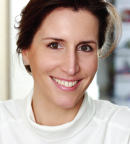
Anti–PD-1 and anti–PD-L1 agents represent a revolution in the treatment of advanced urothelial cancer. I believe that immunotherapy will be the treatment option for first- and second-line advanced urothelial cancer, but there are remaining questions.— Laurence Albiges, MD, PhD
Tweet this quote
Formal discussant Laurence Albiges, MD, PhD, of Institut Gustave Roussy, Villejuif, France, tried to put the results of KEYNOTE-052 and CheckMate 275 into perspective.
“Anti–PD-1 (programmed cell death protein 1) and anti–PD-L1 (programmed cell death ligand 1) agents represent a revolution in the treatment of advanced urothelial cancer. I believe that immunotherapy will be the treatment option for first- and second-line advanced urothelial cancer, but there are remaining questions,” she said.
“Both studies suggest a role for the PD-L1 biomarker, but the major limitation of the biomarker is that PD-L1–negative patients respond. You have to be cautious because different antibodies tested different cutoff points. PD-L1 may not be a good biomarker in unfit patients, like those enrolled in KEYNOTE-052” Dr. Albiges continued.
Many ongoing trials of these immunotherapies will help fill in the gaps, including how to combine and sequence immunotherapy. Studies are comparing single agents vs double agents, maintenance therapy in phase I, sequencing after chemotherapy, and second-line treatment.
“We eagerly await results of ongoing studies,” Dr. Albiges said.
Pressing Questions
As Dr. Albiges sees it, pressing questions concern patient selection for anti–PD-1 and anti–PD-L1 agents and the need for a better biomarker.
“We can’t use PD-L1 expression for patient selection. The quest for a biomarker for patient selection has been frustrating,” she stated.
Other biomarkers are being explored, including interferon gamma gene expression signature, mutational load, and T-cell receptor gene expansion.
“The optimal sequence needs to be defined. There is a role for chemotherapy, and the treatment sequence won’t be the same for all patients. It will depend partly on tumor biology and partly on prior exposure to chemotherapy and radiation therapy,” she said. ■
Disclosure: Dr. Albiges reported no potential conflicts of interest.

